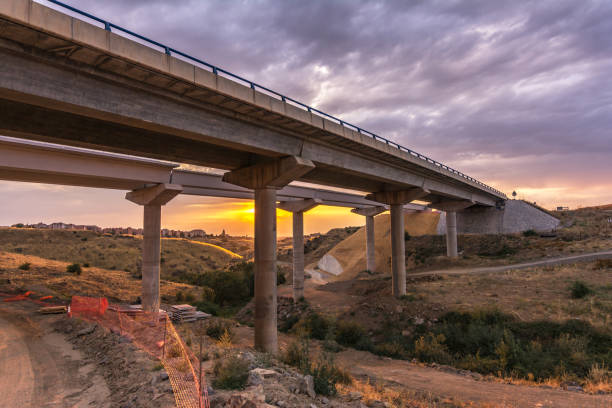Lower Thames Crossing (LTC) executive director Matt Palmer is “confident” the proposed National Highways project will be given the go ahead because of the “obvious” need to ease congestion on the Dartford Crossing. Palmer told NCE that the congestion issues on the Dartford Crossing – where the “evening” peak begins at 10am and finishes at 10pm – mean there is a strong case for another route. “I am confident that any government whether it be blue or red will approve it,” he said. “The issue is just when and timing. “We’ve spent a lot of time looking at it and this year all of our new governments have been supportive because the need for the scheme everyday is demonstrable. It never fails to deliver, the congestion on Dartford. It is the worst piece of congestion we’ve got in the UK. The impact it has is dramatic so something needs to happen. “It’s so obvious why you need it. We’ve taken a number of our key stakeholders to the control room at Dartford and you only have to be there 15 minutes and something will happen. We have 50 people on standby just to keep one mile of road running. It is bonkers. So you’ve got an absolutely compelling narrative for the scheme.” The 23km of new tunnels and roads that for the LTC will link Kent and Essex to relieve congestion at the Dartford Crossing. The development consent order (DCO) application for the LTC was submitted in early November, two years after the initial application was withdrawn due to the Planning Inspectorate’s demand for more information in relation to construction plans and environmental mitigations. The DCO application has now been accepted by the Planning Inspectorate for examination.

Reflecting on the Lengthy DCO Process, Palmer Said he is “a pragmatist”.
He explained: “We’re a democratic country and back in 2008 the Planning Act came together. Up until about 2017 everything ran through really smoothly and then thereafter it’s got more difficult. You can kind of blame that on Brexit if I’m honest because it’s really the National Policy Statements that are getting old that we just didn’t have any Parliamentary time to get them up to date. “If you look at what they asked us to do, it’s all things you would expect: do environmental surveys, do an in-depth environmental assessment. All of that stuff is kind of logical. The only place that does it differently is the Middle East or China.” NCE recently revealed that National Highways spent £267M on the development of the two DCO applications. A leading planning lawyer told NCE that this figure is not unexpected in the current climate, with applicants having to provide much more robust information on carbon and biodiversity targets. However Palmer said that “everyone talks about the cost, but what it actually does is bring work forward so what you end up doing is more work up front which gives you better cost certainty and better outcomes”. He added: “So while everyone moans about it, much of that is about driving out uncertainty. It’s very hard to say what’s wasted, when actually a lot of it is just front-end loading it. Now if you look at it from a commercial perspective, if you think there’s a chance of it not going ahead, you’re being forced to bring forward a lot of work that may or may not happen but if you look at the success rate of DCOs it still runs in 98% to 99%. “I think the biggest problem is not so much the cost, it’s the time, because it typically takes seven years to plan a job and get it on site, then it normally takes about seven years to built it. So you’re 14 or 15 years out of date when you open it. Someone once said to me: ‘you’ll always build stuff that’s out of date’ and, to some extent, there’s a danger of that.”

Then there is the complication of the Size of Projects like the LTC.
“These are big assets and everyone is quite risk averse with big assets so you typically want to go just give me what was good last year,” Palmer explained. “So asset owners are well known for being risk averse because we’ve got to have an asset that lasts 100 years but carbon is challenging us to be different.” National Highways has designated the LTC as a carbon neutral construction “pathfinder” project. This means that all procurement for the project will target low carbon construction methods with incentives that drive further continuous carbon reduction. It is to set a benchmark for carbon neutral construction and help the UK reach net zero by 2050. National Highways has also announced that it will be setting up a digital Carbon Academy as part of the LTC project, with the aim of leaving a “legacy of green skills” for businesses and people in the region. Speaking at NCE’s Tunnelling Festival earlier this month, National Highways Lower Thames Crossing project director, tunnels, Sinisa Galac put an even finer point on the imperative for the project to eradicate carbon emissions and lead the way for future projects. “We have been rightfully challenged by environmental groups and by the government to be where we should be with the Paris Climate Agreement. And the Climate Change Act 2008 is a legally binding document – if we don’t end up on the path towards carbon net zero in 2050, we are going to be breaking the law,” he said. Government has supported us, and they have announced us as a carbon pathfinding scheme […] It means we’ve got the budget for innovation, it means that we’ve apparently got the support in the change in the standards when required. Without this, we will not be able to deliver and we’re going to fall off the curve going towards 2050.

“Alternative? There is None. If we don’t Resolve it, there Won’t be a project.”
Palmer also emphasised the importance of making a difference when it comes to carbon, particularly in light of the net zero 2050 target. “We’ve got an economy based on 200 years of fossil fuels and we’ve got basically 25 years to get off it,” he said. “200 years versus 25. And that comes back to why we’re challenging carbon so much on this project because if we don’t do it on this project, we’ll anchor our supply chain in last year’s thinking for another 10 years and we’ll be 10 years closer to 2050 and not moving on.


Recent Comments